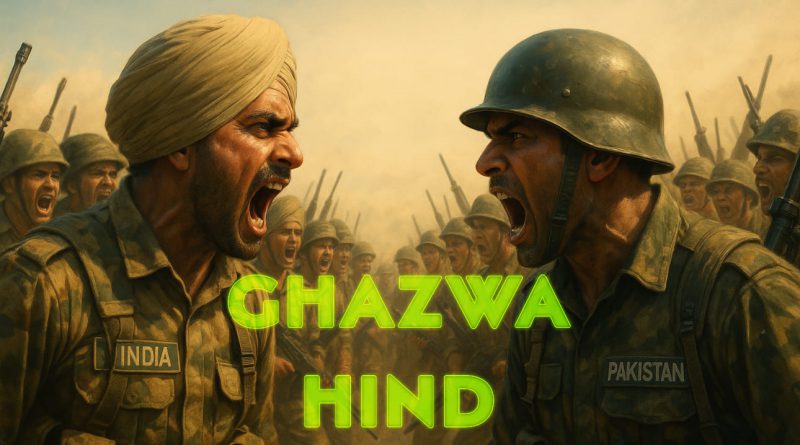Ghazwa-e-Hind: Between Misused Prophecy and Modern Political Fantasy
If any country, including Pakistan, ever invades India in the name of Ghazwa-e-Hind, they will find Indian Muslims defending their homeland
Among the many ideas that have found their way into the modern Islamic revivalist narrative, few are as persistently misunderstood—or dangerously misused—as the concept of Ghazwa-e-Hind. Popularized in contemporary times by figures like the late Dr. Israr Ahmed, it has come to be viewed not as a historical episode or a symbolic metaphor, but as a yet-to-be-fulfilled call to military conquest. This interpretation, though emotionally charged, is divorced from Islamic orthodoxy, historical context, and contemporary political reality.
This misreading of Islamic eschatology has become especially potent in Pakistan, where it has been weaponized by a segment of the clergy and even military-linked media. But what the masses often don’t see is that such a vision not only contradicts Islamic legal tradition, but also threatens the harmony of the Indian subcontinent, especially the future of Indian Muslims.
A Historical View—Not a Military Manual
The hadith that mentions Ghazwa-e-Hind is reported in Sunan an-Nasa’i (Hadith 3175), Musnad Ahmad (Hadith 23804), and al-Tabarani’s al-Mu’jam al-Kabir. The narration speaks of two groups saved from Hellfire—one that fights in India and another that accompanies Jesus, the son of Mary, during his second coming. However, Islamic scholars have long disagreed about the authenticity, context, and timeline of these narrations.
Renowned Hadith scholar Shaykh Nasiruddin al-Albani graded some of the chains as weak (da’if), while others like Ibn Hajar al-Asqalani in Fath al-Bari considered them authentic but possibly fulfilled during the early Islamic conquests. Ibn Kathir, in Al-Bidaya wa’l-Nihaya, also noted that the interpretation of these ahadith was limited to earlier periods of conquest.
Classical historians like al-Baladhuri in Futuh al-Buldan detail the campaign of Muhammad bin Qasim into Sindh (712 CE) as a response to an appeal from Muslim merchants and not as a sweeping religious war. The conquest was confined to a narrow region and did not reflect any systematic plan to convert India. Furthermore, the Chachnama, a semi-legendary Persian text documenting this campaign, narrates how religious freedom was granted to local Hindus and temples remained operational under Islamic rule.
Islamic scholar Dr. Ayesha Jalal, in her book Partisans of Allah: Jihad in South Asia, asserts that Ghazwa-e-Hind has been inflated in Pakistan’s religious discourse not because of religious necessity, but due to state-sponsored ideology. She writes that this hadith has “resurfaced with renewed intensity in Pakistan’s strategic imagination, filtered through a millenarian lens.”
The Qur’anic Command: No Compulsion in Religion
The most authoritative source in Islam—the Qur’an—states unequivocally: “There is no compulsion in religion” (Qur’an 2:256). This verse, supported by the consensus (ijma’) of scholars, has been interpreted as a foundational principle of religious freedom. In Tafsir al-Qurtubi, Imam al-Qurtubi elaborates that Islam forbids coercion because belief requires conviction, not force.
The Prophet Muhammad (peace be upon him), when inviting tribes to Islam, used persuasion, kindness, and exemplary character—not threats. As recorded in Sirat Ibn Hisham and Tabaqat Ibn Sa’d, his approach to da’wah was rooted in wisdom, not warfare.
Moreover, Tafsir al-Tabari on verse 16:125—“Call to the way of your Lord with wisdom and beautiful preaching…”—explains that this verse sets the tone for all Islamic outreach. Any idea that religious dominance can be achieved through military force runs counter to the Qur’anic message and Prophetic model.
Prophecy ≠ Policy
Yes, Islam contains eschatological prophecies—many of which describe dramatic geopolitical changes in the end times.
The Prophet (peace be upon him) never told Muslims to build strategies around ghazwaat of the future. Instead, he focused on justice, reform, and internal purification.
Consider the Ghazwa of Abwa and Ghazwa of Ushayrah—expeditions that ended without a single arrow being shot. As documented in Al-Maghazi of al-Waqidi, many ghazwaat were precautionary or diplomatic. This is supported by Imam al-Nawawi’s commentary on Sahih Muslim, where he notes that military action in Islam is conditional on ethical, legal, and political necessities—not eschatological ambitions.
The Spread of Islam: A Moral Project, Not a Military One
Historically, Islam’s most significant growth occurred in regions where armies never marched. Southeast Asia, East Africa, and large swathes of India were introduced to Islam not through conquest but through trade and spiritual invitation.
Dr. Richard Eaton, in his landmark study The Rise of Islam and the Bengal Frontier, highlights how Sufi saints and local rulers facilitated Islamization in Bengal through land reforms, spiritual guidance, and social integration—not through war. Similarly, Syed Abul Hasan Ali Nadwi in Islam and the World emphasizes that Islamic civilization at its best was spread through service, justice, and education.
The Prophet himself said: “I was sent to perfect noble character” (Musnad Ahmad, Hadith 8595). This foundational hadith is echoed in the works of Imam al-Ghazali in Ihya Ulum al-Din, who taught that spiritual excellence—not militarism—is the soul of Islamic revival.
Pakistan’s Fantasy vs Indian Muslims’ Reality
One of the more troubling developments is the Pakistani state’s occasional use of Ghazwa-e-Hind as a symbolic justification for cross-border ambitions. In textbooks, speeches, and even TV dramas, the narrative of a future campaign to “liberate” Indian Muslims is floated as a divine responsibility.
But such narratives overlook one major truth: Indian Muslims are not waiting for salvation. They are proud citizens of India, heirs to over a thousand years of Islamic contribution to the subcontinent.
India has produced towering Islamic scholars—Shaykh Abdul Haq Muhaddith Dehlawi, Shah Waliullah al-Dihlawi, Maulana Azad, and countless others. Its institutions—from Darul Uloom Deoband to Nadwatul Ulama—have trained generations of global scholars. The Indian Muslim identity is not subordinate to any external power. It is deeply rooted in the land, language, and ethos of India.
If any country, including Pakistan, ever invades India in the name of Ghazwa-e-Hind, they will find Indian Muslims defending their homeland, not cheering from the sidelines. As the Qur’an instructs: “Stand firmly for justice…” (4:135). That includes standing against unjust aggression—even if it’s done in the name of religion.
From Brigadier Muhammad Usman, the hero of Nowshera, to Captain Haneefuddin, who laid down his life in Kargil, Indian Muslims have proven their loyalty with blood.
Let no one mistake their silence for weakness or their faith for disloyalty. The Prophet loved Makkah. The Indian Muslim loves India.
Time for Responsibility, Not Rhetoric
Dr. Israr Ahmed’s intellectual legacy is mixed. While he awakened many to the idea of Islamic revival, his fixation on militarism—untethered from contemporary fiqh and political wisdom—misguided many. Today, young Muslims must be trained not in war slogans but in the Qur’an, Hadith, ethics, law, and service.
The return of a Caliphate, if it happens, must mirror the model of the Prophet—founded on justice, consultation, and mercy. Not through firebrand nationalism or weaponized hadiths.
Ghazwa-e-Hind has become more of a political trope than a theological reality. When read responsibly, Islamic tradition offers no justification for cross-border aggression dressed in prophecy. The real ghazwa we need today is against ignorance, sectarianism, and political manipulation.
Let us turn our energies toward rebuilding our societies—through knowledge, reform, and character. That is the legacy of the Prophet. That is the path of the righteous.



